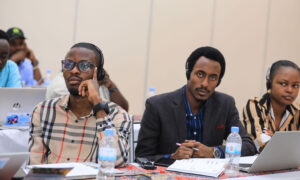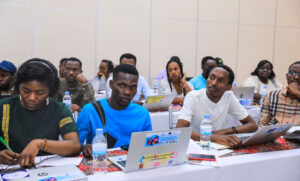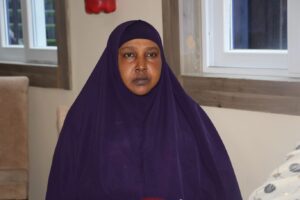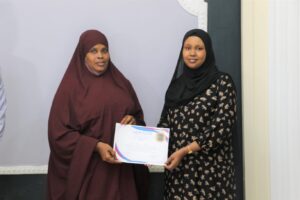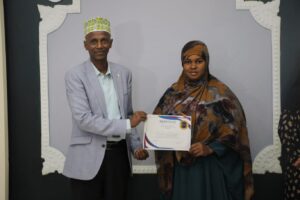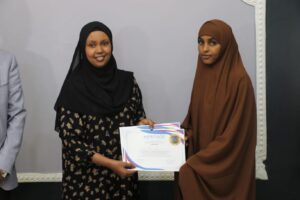In an effort to empower, educate and engage Rwanda’s youth, the Rwanda Peace Partnership (RPP) a collaboration between Interpeace, Aegis Trust and Never Again Rwanda (NAR) organized the first ever Rwanda YouthTalks, hosted on the eve of the International Youth Day on 11th August. The event brought youth from across Rwanda to participate and discuss the theme: ‘Green Skills for Youth towards Sustainable Development and Peace’.
Young individuals from diverse backgrounds, ranging from students, entrepreneurs, activists and policymakers, gathered at the Kigali Genocide Memorial – Amphitheatre to learn more and share about their experiences with green skills. The diversity in participants provided the perfect setting for learning, sharing experiences and perspectives to lead to the creation of creative solutions for pressing environmental and social concerns in Rwanda and across the globe.
Speaking at the event as a youth representative, Larissa Umulinga emphasised that “in a world full of challenges, it’s crucial to grasp the vital link between climate action and peace. Youth have unique power for change. Our passion can reshape policies, nurture sustainable living, and reduce conflict risks and climate crisis. We guide a future where environmental well-being and global peace go hand in hand.”
Being a youth-centered event, the Rwanda YouthTalks featured personal stories from 5 young speakers around the concept of green skills including Vania Odelice Ineza, a fashion entrepreneur, Noel Nizeyimana, a green entrepreneur, Florence Twambazimana, a young businesswoman, Rulinda Kwizera, junior researcher in mental health, and Andersonne Adolatha Uwineza, a multi-talented artiste. Drawing from their experiences, the speakers shared their understanding and use of green skills in their personal and professional lives to promote climate action, mental health, entrepreneurship, and peace in their communities.
Using a storytelling format, speakers delved into the significance of nurturing green skills amongst the youth; encouraging their peers to not wait for the change, but to be the change needed for the sustainability of development and peace in Rwanda.
Sharing his story of how he co-founded a company that transforms waste into organic fertiliser to revolutionise agriculture in his country, Noel Nizeyimana challenged youth to think out of the box and seize every opportunity around them, especially in environmental protection sector. “In every challenge, there is an opportunity. I invite the youth to take a similar approach. Environmental protection and agricultural transformation contribute to building sustainable and peaceful communities.”
Florence Twambazimana, a descendant of Genocide Survivors who lives in a reconciliation village located in eastern Rwanda, highlighted the importance of economic empowerment for young people that greatly contributes to building resilient peace in communities. “When you live in poverty your mindset is warped. Poverty has negative side effects on social cohesion and can result in more conflict. But economic opportunity can change that.” She said as she shared the story of how running a joint business with descendants of Genocide perpetrators, she considered enemies has helped to build trust and good relationship among them.
The diverse speakers emphasized that by equipping young people with the knowledge and tools necessary to adopt sustainable practices, Rwanda can foster a generation of responsible and proactive citizens who actively contribute to safeguarding the environment while simultaneously advancing their own opportunities.
The Rwanda YouthTalks also provided a space for young innovators to showcase their sustainable projects and initiatives through an exhibition which featured various eco-friendly products ranging from health, beauty, fashion, and decorations. From eco-friendly startups to community-driven conservation efforts, these endeavors demonstrated the immense potential of young minds to drive positive change in their communities.
The first ever Rwanda YouthTalks served as a shining example of how young people can play a pivotal role in shaping a more sustainable and peaceful world. By focusing on the importance of green skills for sustainable development and peace, the event emphasized the need for collective action, innovation, and informed dialogue. As we look to the future, Rwanda’s youth has shown their capability to inspire and lead in the commitment towards a greener, and more harmonious future for generations to come.
Africa's Great Lakes region has a complex history marked by periods of conflict, political instability and social challenges. In this context, young people have untapped potential as catalysts for positive change. Their ability to promote peace within the community rests not only on their unique qualities, but also on their determination to play an active part in building a better future. Recognizing, nurturing and supporting this potential is essential to building lasting peace and stability in the region.
Interpeace, in partnership with the Refugee Law Project, Centre for Conflict Alert and Prevention (CENAP), Never Again Rwanda (NAR), Action pour la Paix et la Concorde (APC), and the Pole Institute, trains young innovators aged 18 to 30 to take part in governance, peacebuilding, and development processes in Uganda, Burundi, Rwanda, and the Democratic Republic of Congo (DRC). The capacity-building and mentoring programme consists of three face-to-face sessions and two remote sessions. The young innovators, both men and women, are selected on their experience and commitment to launching positive peacebuilding initiatives in their communities and the wider region. The programme provides them with the tools and guidance to channel their creativity and translate innovative ideas into actionable projects.
In early August, young innovators from the Great Lakes region were in Kigali, Rwanda for a face-to-face mentorship training session. The innovators presented ideas to a diverse group of stakeholders, including representatives from the partnering organisations, seeking grants to support their advocacy and social cohesion projects. This third face-to-face session also served as a platform for imparting vital skills such as trauma healing, community engagement, gender and conflict sensitivity in project management, and critical thinking. These skills will help them better implement and scale up their initiatives.
In the Great Lakes region, mental health problems are on the increase among young people. They are further exacerbated by the distinct experiences and circumstances resulting from past conflicts and current political turmoil. Recognising this pressing issue, the youth mentoring programme has incorporated a specialised session on mental health. Ndahiro Derrick Alte, a young innovator from Rwanda, mentored by NAR, acknowledged the impact the training had on him, “The third face-to-face training in Rwanda was a transformative experience that provided me with an opportunity to dig deeper into the complicated world of trauma, its causes, and the effect it has on individuals and communities. I have also been able to acquire knowledge and tools on how best to facilitate healing, both for myself and for others who are on the road to mental health recovery.”
The mental health session not only broadened the young people’s comprehension of trauma but also equipped them with practical tools and techniques to offer compassionate support to those in need of healing.
“I really enjoyed the training in Kigali! I learned that stress is different from trauma! And that stress can give us a boost, whereas trauma can hinder our personal development!
Therapy is the best way of dealing with trauma and enabling people to develop despite their traumatic experiences,” appreciated Judith Balerha, a young innovator from DRC, mentored by the Pole Institute.
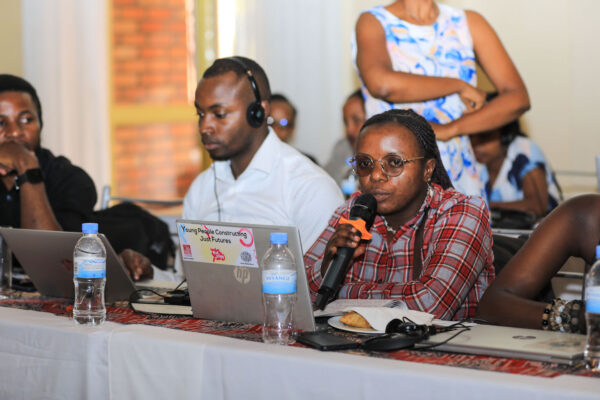
 The journey began with the first "face-to-face" session, where these people come together to acquire the essential general and technical skills needed to implement youth-led peace initiatives. The second "face-to-face" session proves to be a crucial point in the process. It involves fine-tuning the development of the initiative and drawing up strategic plans for the pilot projects. The second distance learning session marks an important step in this process. The partner organisations meticulously advise, support and refine the initiatives until they are ready for implementation. Each mentoring session builds on the progress made in previous sessions. The programme culminates in the third and final face-to-face training session, which culminates in the validation and funding of the young innovators' projects in the Great Lakes region.
The journey began with the first "face-to-face" session, where these people come together to acquire the essential general and technical skills needed to implement youth-led peace initiatives. The second "face-to-face" session proves to be a crucial point in the process. It involves fine-tuning the development of the initiative and drawing up strategic plans for the pilot projects. The second distance learning session marks an important step in this process. The partner organisations meticulously advise, support and refine the initiatives until they are ready for implementation. Each mentoring session builds on the progress made in previous sessions. The programme culminates in the third and final face-to-face training session, which culminates in the validation and funding of the young innovators' projects in the Great Lakes region.
Commenting on the importance of the scheme, Interpeace programme manager Salvadore Safari Shamaba stresses that the face-to-face training has enabled the young people to discuss the content of their initiatives and capitalise on each other's experiences to enrich them before they are validated.
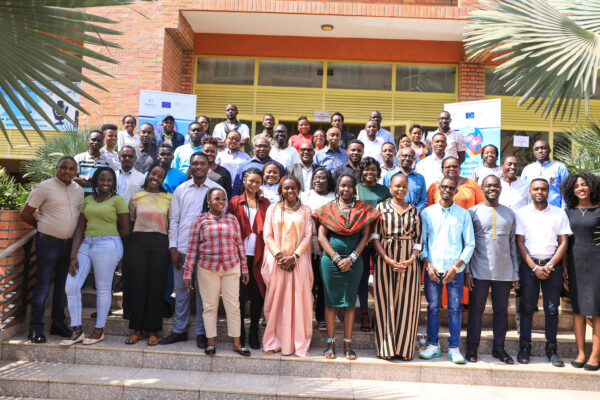
 "These initiatives will enable the young innovators involved in the regional programme to mobilise the region's youth and make them catalysts for lasting peace in the Great Lakes region. Thanks to this funding, these young innovators will implement activities aimed at strengthening social cohesion and capacities. They will present the results of these activities to the region's various technical and financial partners, encouraging them to promote youth-led initiatives in the Great Lakes region," said Mr Salvadore.
"These initiatives will enable the young innovators involved in the regional programme to mobilise the region's youth and make them catalysts for lasting peace in the Great Lakes region. Thanks to this funding, these young innovators will implement activities aimed at strengthening social cohesion and capacities. They will present the results of these activities to the region's various technical and financial partners, encouraging them to promote youth-led initiatives in the Great Lakes region," said Mr Salvadore.
The Great Lakes programme, funded by the European Union and the Swiss Development Cooperation, is a testament to the resilience, innovation and unwavering dedication of young people in the four countries to successfully transform their communities. It is a story of collaboration, a journey of innovation and a vision realized through the spirit of youth empowerment.
"We were free to present our initiatives and defend them in front of our mentors. After several training sessions, we can now put what we've learned into practice. Our aim is to promote social cohesion in the Great Lakes region by bringing young people together around initiatives," said Françoise Mwiriri, a young innovator from the DRC sponsored by APC.

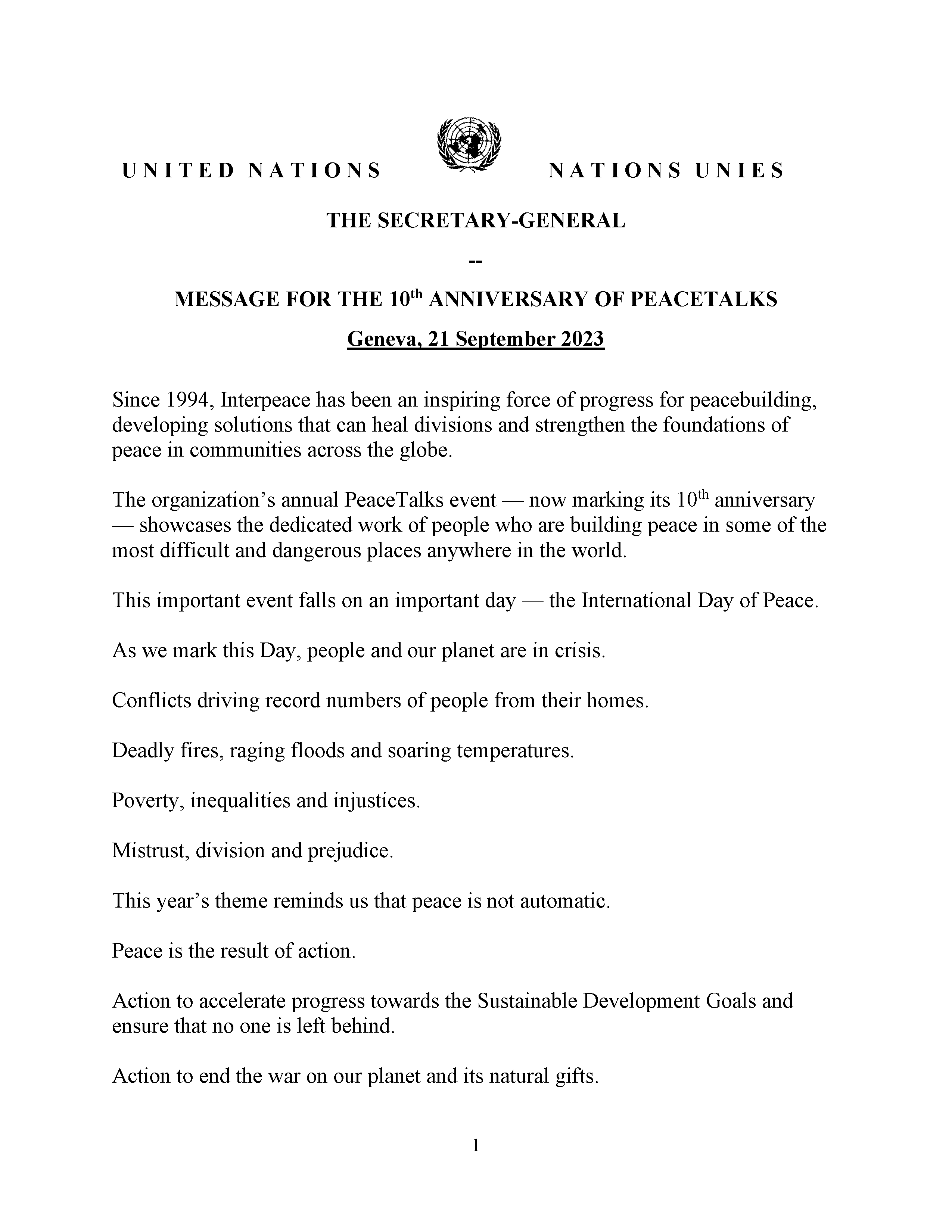
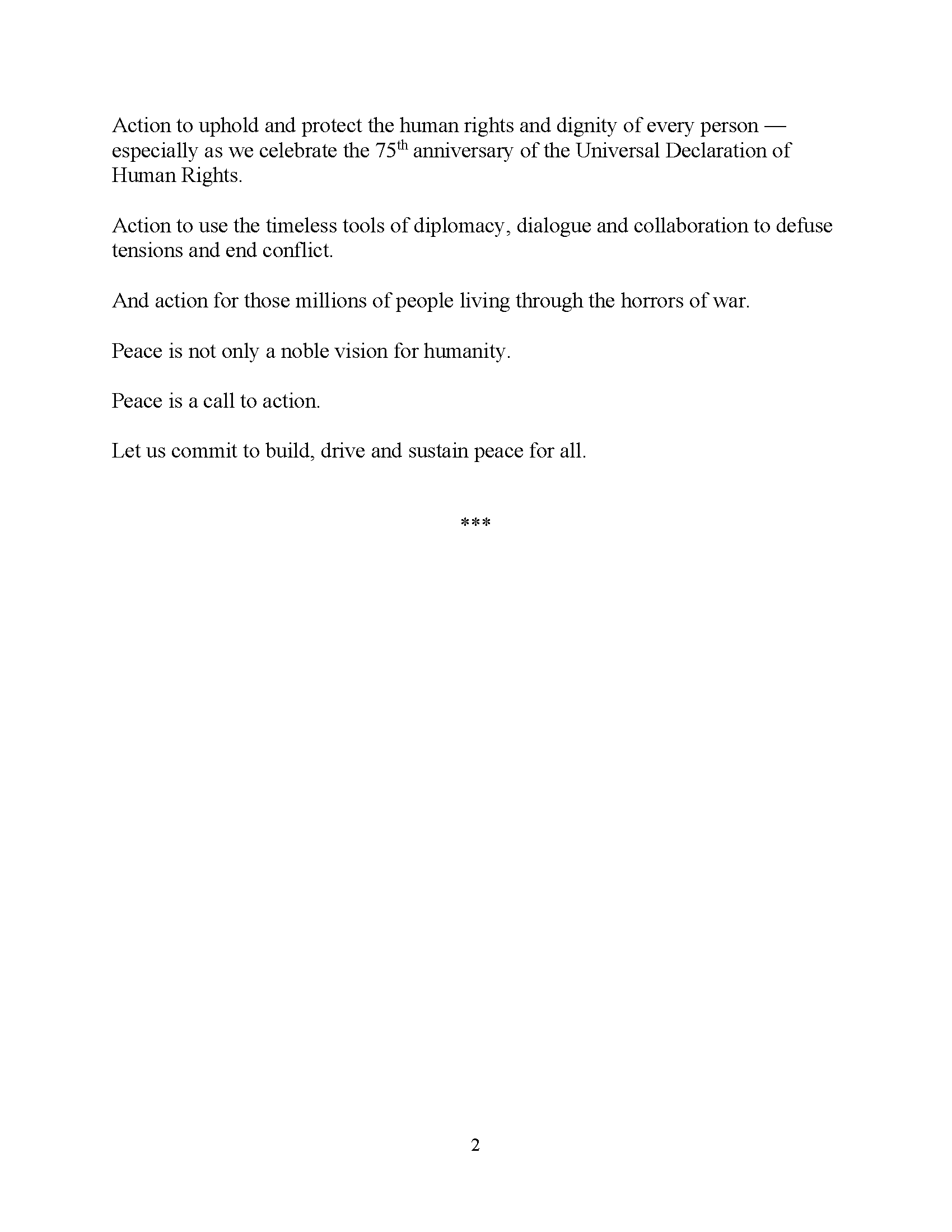
How to work for peace? Around the world, dozens of conflicts are causing poverty, hunger, displacement, inequality, all while climate change is accelerating. The 2023 edition of the Geneva PeaceTalks wants to reflect on the official United Nations theme for the International Day of Peace, “Actions for Peace: Our Ambition for the Global Goals”. It is a call to action that recognizes our individual and collective responsibility to foster peace, which contributes to the realization of the Sustainable Development Goals (SDGs).
This 11th edition of the PeaceTalks will take place on the occasion of the International Day of Peace, September 21, 2023, at the Palais des Nations in Geneva, which coincides with the SDG Summit, marking the mid-point milestone in implementing the SDGs. A hybrid event, the meeting will welcome an in-person audience and will be broadcast live online.
Speakers from different backgrounds will bring their points of view and explain their actions for peace through a series of inspiring talks:
- Nilofar Ayoubi, women and human rights defender fromAfghanistan, journalist, CEO of Asiatimes.af
- César López, renowned Colombian musician and composer and social leader
- Nina Verdiane Niabodé, host and producer of Radio Ndeke Luka, Central African Republic (CAR)
- Maiwen Ngalueth, South Sudanese humanitarian and peace professional
- Sophia Stril-Rever, spiritual activist and teacher from France
- Cheick Fayçal Traoré, Burkina Faso, peacebuilding and development professional
- Alicia Sanders-Zakre, nuclear disarmament researcher and activist and Research and Policy Coordinator at the International Campaign to Abolish Nuclear Weapons (ICAN)
- Special video screening of “Peace Begins With Me”, a creative collaboration between Congolese peacekeeper and musician Pacifique Akilimali and Nigerian peace advocate and poet Maryam Bukar Hassan
- Special video screening of “1.5 Degrees of Peace”, from Kasha Sequoia Slavner Gen Z activist and award-winning director
- A message on the International Day of Peace from António Guterres, ninth Secretary-General of the United Nations
- Special remarks by Tatiana Valovaya, 13th Director-General of the United Nations Office at Geneva
- Closing remarks, Simon Gimson, Acting-President and Chief Operating Officer, Interpeace
Through short 8 minute talks, speakers will share their vision and stories of peace with audiences from around the world. This will be the 11th edition of the Geneva PeaceTalks.
Co-founded in 2013, the PeaceTalks is a global platform dedicated to telling and sharing inspirational stories for peace. Harnessing the power of storytelling, the PeaceTalks creates a space encouraging dialogue, reflection and inspiring hope. Videos of previous editions at: www.peacetalks.net
WHO
The Geneva PeaceTalks are co-organized by the United Nations Office at Geneva, Interpeace, the Geneva Peacebuilding Platform, with the support of the Permanent Mission of Switzerland to the UN.
This edition is made possible with the support of the Swiss Confederation, the Canton and City of Geneva, Mirabaud, Geneva Call and Fondation Hirondelle. The Musical Performance by César López is made possible through the Plan for the Promotion of Colombia Abroad of the Ministry of Foreign Affairs of Colombia.
WHEN
The event is scheduled on the International Day of Peace, 21 September 2023, 16:00-18:00. It will be followed by a reception.
WHERE
In-person: Room XVII, Palais des Nations, Geneva.
Livestream online at http://webtv.un.org.
All in-person attendees need to have pre-registered online via the link https://indico.un.org/event/1001797/. For more information, www.peacetalks.net.
CONTACT:
Luvini Ranasinghe, Head of Communications at Interpeace / ranasinghe@interpeace.org / Tel : 079 475 64 95.
Despite conflict and instability, Somalia has made progress in governance, democracy, and state-building. However, amidst these advancements, one critical aspect has lagged- the inclusion of women in these critical processes. Women in southern Somalia's Benadir are progressing in various fields, transforming the socio-economic landscape. However, when it comes to formal governance, women continue to be underrepresented.
The Heritage Institute for Policy Studies (HIPS), as part of the Talo Wadaag II programme, organised two workshops to better understand the challenges faced by resilient women in Benadir when it comes to participating in governance, state-building, and conflict prevention. Talo Wadaag is a joint effort by Interpeace and its partners - the Academy for Peace and Development (APD), the Puntland Development Research Center (PDRC), and the Heritage Institute for Policy Studies (HIPS) - in Somaliland, Puntland, and Benadir. Its aim is to promote citizen-centered peacebuilding and democracy by engaging communities in these critical areas.
The first workshop, held on 23 February 2023 employed a range of participatory approaches. These included drawing exercises that allowed women to depict their perceptions and experiences of good governance, interactive group discussions to facilitate the exchange of ideas, presentations, individual activities, and informal focus group discussions. These methods effectively engaged the participants, providing them with a platform to voice their thoughts and share their experiences, particularly regarding their vision of good governance. The workshop enabled HIPS to gather valuable insights into how women perceive their roles within Somalia's governance and state-building processes.
Dr. Yusuf Sheikh Omar, Director of the Talo Wadaag 2 Project at the Heritage Institute for Policy Studies, emphasised the importance of these insights. “Understanding women’s views on governance is vital as preparations for elections in Benadir are underway. Recognising the significance of women’s involvement is key for improving Benadir’s governance and building an inclusive and enduring future for Somalia,” he stated.
Addressing the challenges that limit women’s political participation and incorporating their perspectives is essential to strengthening the social contract. This ensures that the state-building process contributes to a constructive, peaceful, and prosperous society.
The second workshop, held on 13 June 2023, continued HIPS’s efforts to empower the women of Benadir. It equipped them with conflict prevention skills, strategies for conflict resolution, and the means to promote a culture of peace. Discussions also revolved around the role of media activism in driving societal change.
A female participant appreciated the effort put into teaching skills to create social change. “I leave this training feeling empowered as they tailored it to our needs and interests. I feel empowered to become an agent of change for my community,” she stated.
The workshop marked a momentous stride in empowering the women of Benadir in Mogadishu. It equipped them with essential knowledge and skills, fostering their active engagement in public affairs and promoting constructive societal transformation. The Talo Wadaag programme has initiated discussions with relevant stakeholders, such as the Benadir Regional Administration (BRA) and the Ministry of Interior, Federal Affairs, and Reconciliation (MoIFAR). These discussions have identified entry points to support plans for upcoming democratic processes, such as the Benadir elections.
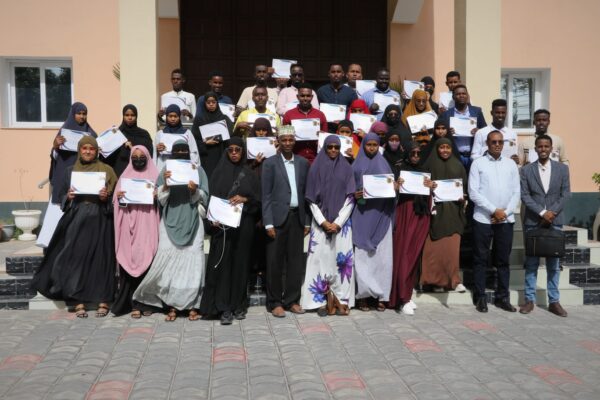
“The skills imparted to the women and the recommendations they provided will be utilised by the Talo Wadaag programme to enhance overall advocacy for increased women’s political participation and representation, especially in Benadir. HIPS and its partner, Interpeace, have already identified entry points to engage relevant stakeholders and contribute to the policy thinking that will govern political processes, such as the vision for elections in Benadir,” affirmed Dr. Yusuf.
“The workshops held by Talo-Wadaag Consortium, led by HIPS exemplify the commitment to contribute towards the creation of an inclusive and equitable governance landscape in Somalia. These initiatives empower women, recognising their vital role in shaping the future of Benadir and the country,” emphasised Interpeace’s Somali Programme Officer, Jesse Kariuki, on the importance of promoting governance skills for women.
TALO-WADAAG 2: Participatory Research Focused on Governance and State building processes in Somalia
Empowering Women in Benadir: The Power of Active Citizenship – Talo-Wadaag 2
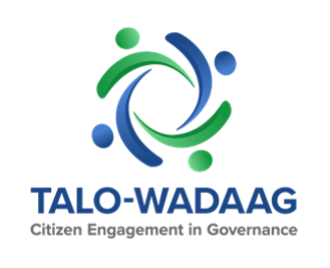
According to the Rwanda Mental Health Survey (RMHS), mental health conditions are significantly prevalent among the youth in Rwanda, with rates ranging from 10.2% to about 20%. The RMHS findings reveal that a significant proportion of Rwandans aged 14 to 25 are struggling with psychological disorders. This statistic emphasises the urgent need for comprehensive mental health support systems that cater specifically to the unique challenges faced by young individuals.
Never Again Rwanda, Interpeace’s local partner in Rwanda implementing the Youth Innovation Lab for Peace (YouthLab) programme, organised an event themed the Amani Youth Expo and Summit focused on addressing mental health and the well-being of young people in Rwanda. The Expo and Summit aimed to raise awareness about the mental health challenges faced by young people in Rwanda and provide a platform for open discussions and innovative solutions.
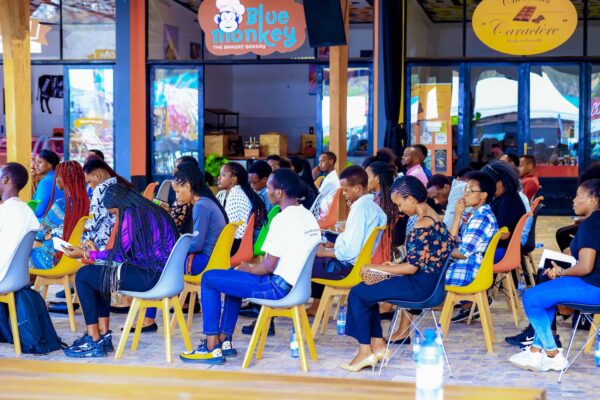
The Amani Youth Expo and Summit served as a catalyst for change under the YouthLab programme spearheaded by the Young Innovators, which is dedicated to addressing youth mental health. Through a series of thought-provoking panel discussions, engaging workshops, and interactive activities, participants were actively encouraged to share their personal experiences and contribute their valuable ideas on how to enhance mental health services and support systems for young Rwandans. The overarching goal was to foster an environment of collaboration and collective action where diverse perspectives could converge to shape effective strategies for improving the mental well-being of the nation's youth.
Mfuranzima Fred, the Managing Director at Imfura Heritage in Rwanda and a Young Innovators representative, emphasised the Youthlab Programme's significance. “Under the YouthLab initiative, we are committed to supporting the well-being of young individuals. I take this opportunity to thank the event partners and donors for their support. Their invaluable contributions have made the programme a reality.”
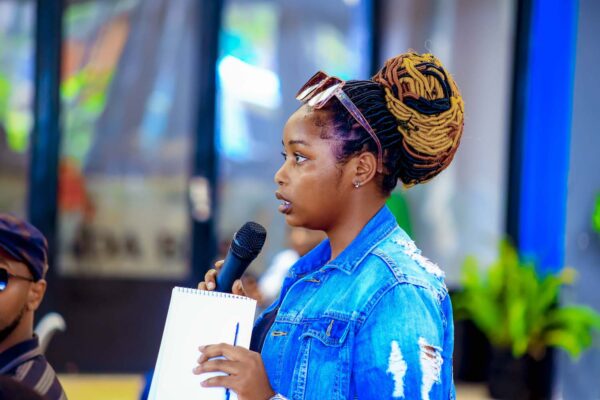
During his opening remarks, Hakomeza Emmanuel, youth intervention senior officer of the Rwanda Biomedical Center, Kigali (RBC), pointed out the significant connection between mental health and youth in Rwanda. “We need to address the mental health challenges faced by young people and put in place comprehensive support systems. These challenges can significantly impact their overall well-being and hinder their ability to thrive academically and socially. By prioritising mental health support, we can ensure that young people have the resources they need to navigate these challenges and lead fulfilling lives.”
The panel discussions led by Derick Ndahiro and the audience's participation offered practical approaches to tackling mental health challenges among youth. The panellists included Jane Abatoni Gatete, a mental health expert; Umuraza Faure Chantal, a passionate mental health advocate and book author; Kabasinga Innocente, a young innovator; and Annick Ishimwe, a dedicated mental health youth advocate. The panellists shared their expertise and personal experiences, providing valuable insights and guidance.
The sessions blended artistic expression with poignant performances, including a theatrical play, compelling thyme poems, and evocative renditions by celebrity musicians. Celebrity musicians such as Papa CYANGWE and B-Threy took the stage, captivating the audience with their heartfelt performances. Comedians Japhet (Bigomba guhinduka) and Rusine Patrick used humour and creativity to convey the importance of young people expressing their pain, seeking help, and feeling free to explore their emotions.
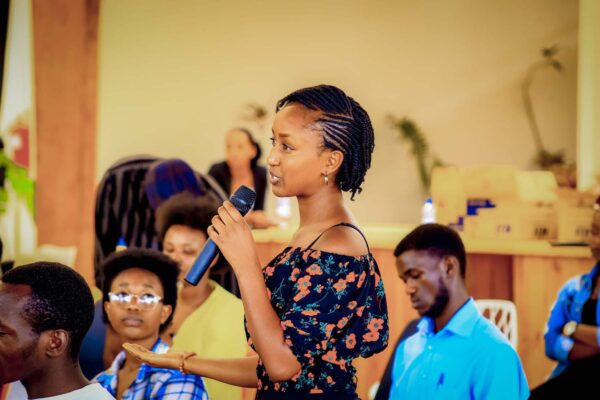
The Expo showcased local NGOs, youth initiatives, and businesses dedicated to mental health advocacy, facilitating networking, and offering a platform for learning and discovering resources essential for nurturing a supportive environment for youth mental health. It emphasised the urgency of prioritising mental health and breaking down stigma, fostering a society where the well-being of young people takes centre stage.
Through the projects “Youth Innovation Lab for Peace (YouthLab)” and “Cross-border Dialogue for Peace in the Great Lakes Region”, funded by the European Union and the Swiss Development Cooperation (SDC), Never Again Rwanda and Interpeace are committed to empowering young minds, spreading mental health awareness, and cultivating an inclusive community.
